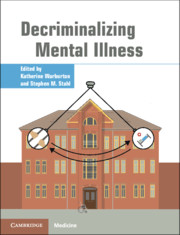Book contents
- Decriminalizing Mental Illness
- Decriminalizing Mental Illness
- Copyright page
- Contents
- Contributors
- Part I Introduction/Description of the Problem
- Chapter 1 Balancing the Pendulum: Rethinking the Role of Institutionalization in the Treatment of Serious Mental Illness
- Chapter 2 Deinstitutionalization and Other Factors in the Criminalization of Persons with Serious Mental Illness and How it is Being Addressed
- Chapter 3 A Brief History of the Criminalization of Mental Illness
- Chapter 4 A Social History of Psychotic Illness
- Chapter 5 Forensic Patients in State Psychiatric Hospitals: 1999–2016
- Chapter 6 A Survey of National Trends in Psychiatric Patients Found Incompetent to Stand Trial: Reasons for the Reinstitutionalization of People with Serious Mental Illness in the United States
- Chapter 7 Forensic Psychiatry and Mental Health in Australia: An Overview
- Chapter 8 Community Forensic Psychiatric Services in England and Wales
- Chapter 9 A Longitudinal Description of Incompetent to Stand Trial Admissions to a State Hospital
- Part II Solutions
- Part III Psychopharmacological Treatment Considerations
- Part IV Nonpsychopharmacological Treatment Considerations
- Part V Criminal Justice and Social Considerations
- Index
- References
Chapter 1 - Balancing the Pendulum: Rethinking the Role of Institutionalization in the Treatment of Serious Mental Illness
from Part I - Introduction/Description of the Problem
Published online by Cambridge University Press: 19 October 2021
- Decriminalizing Mental Illness
- Decriminalizing Mental Illness
- Copyright page
- Contents
- Contributors
- Part I Introduction/Description of the Problem
- Chapter 1 Balancing the Pendulum: Rethinking the Role of Institutionalization in the Treatment of Serious Mental Illness
- Chapter 2 Deinstitutionalization and Other Factors in the Criminalization of Persons with Serious Mental Illness and How it is Being Addressed
- Chapter 3 A Brief History of the Criminalization of Mental Illness
- Chapter 4 A Social History of Psychotic Illness
- Chapter 5 Forensic Patients in State Psychiatric Hospitals: 1999–2016
- Chapter 6 A Survey of National Trends in Psychiatric Patients Found Incompetent to Stand Trial: Reasons for the Reinstitutionalization of People with Serious Mental Illness in the United States
- Chapter 7 Forensic Psychiatry and Mental Health in Australia: An Overview
- Chapter 8 Community Forensic Psychiatric Services in England and Wales
- Chapter 9 A Longitudinal Description of Incompetent to Stand Trial Admissions to a State Hospital
- Part II Solutions
- Part III Psychopharmacological Treatment Considerations
- Part IV Nonpsychopharmacological Treatment Considerations
- Part V Criminal Justice and Social Considerations
- Index
- References
Summary
The history of serious mental illness (SMI) is grim, from a cultural as well as a treatment perspective. The conditions of individuals with psychotic disorders have swung, like a pendulum, from institutional neglect to community neglect and back again over the past several hundred years. At the core of treatment failure is a failure in mental health policy and funding, with the result usually framed as the degree of human institutionalization in jails, prisons and asylums. In the middle of the nineteenth century, institutions designed to deliver moral treatment were considered the humane answer to care properly for the SMI population. By the mid-twentieth century, those same, now overcrowded, institutions were blamed for the horrible conditions of mistreatment of individuals with SMI.
- Type
- Chapter
- Information
- Decriminalizing Mental Illness , pp. 1 - 4Publisher: Cambridge University PressPrint publication year: 2021

